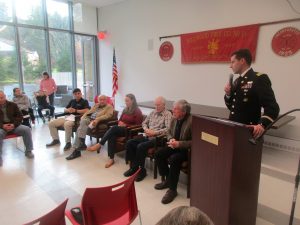New Castle Veterans Day Event Bridges Vet-Citizen Divide

About a year-and-a-half ago, Erica Dunne began interviewing local New Castle veterans to chronicle their thoughts and experiences on serving their country as part of her Girl Scout Gold Award project.
Dunne learned during the course of her interviews, which were done for the New Castle Historical Society, that 2019 was the 100th anniversary of Veterans Day, which was originally referred to as Armistice Day to commemorate the end of fighting in World War I.
The son-in-law of one of the local veterans that Dunne had interviewed reached out to her with an idea for another project. Zach Watson, an Army major who currently teaches at West Point, looked to get the general public and veterans more involved to help understand each other more effectively.
Monday represented the culmination of their collaboration with a special program at the Millwood Firehouse. Five active or former service members, ranging from a current West Point “yearling” to a 75-year-old veteran, spoke of their personal experiences serving in the military before an overflow crowd of other veterans, their families and interested community members.
“It was really supposed to be a community event because we wanted to spread information about Veterans Day and get the community more involved and be veteran focused,” Dunne said.
During his opening remarks, Watson, who teaches international studies at the U.S. Military Academy, spoke of the growing divide between the shrinking percentage of the nation’s population that has served in the military and the vast portion of the general public that has little understanding of what veterans and military families face.
Today, there are about 20 million veterans in the United States, about 7.9 percent of the population; 50 years ago, half of the country’s population was veterans, said Watson, a Chappaqua resident. He was hopeful that programs like Monday’s Veterans Day event will be a small step in bringing together two of the nation’s disparate subsets.
“I’m hoping that today’s event can be part of a conversation for us to exhibit the patience and understanding and generosity of spirit that helps us to overcome the awkwardness we can feel when hearing these conversations so that we choose to engage them rather than avoid them,” Watson said.
Gene West, a Vietnam veteran who went into the Army in 1969, said he grew up on the streets of Brooklyn. Despite seeing combat, he considered himself lucky to be given immense responsibilities at a young age in the Army.
“I’m grateful for the opportunity to get me out of the subways in Brooklyn and (help me) become the leader that I am,” said West, who earned a Purple Heart and other medals.
Another veteran, Christian Wyser-Platte, whose family escaped Nazi-occupied France when he was a baby, agreed that the training and responsibilities from his days in the U.S Navy were advantages for him throughout his life. Having an entire unit work toward one goal was another.
“What the military gives you is a common cause with somebody and bonding,” Wyser-Platte said.
The second half of the two-hour program featured a reception where members of the public could mingle and speak individually with the five featured veterans and other former servicemembers who attended.
New Castle Historical Society member and past president Suzanne Keay, who is Watson’s mother-in-law, said he asked her and Dunne to be involved in the event.
“I personally think this program is an excellent opportunity to help everyone remember the true reason we have Veterans Day,” Keay said.
Dunne, who has been a Girl Scout since kindergarten, said her project helped her understand what veterans experienced, usually at a very young age. The majority of the more than 20 veterans she interviewed served during Vietnam while others were in the Gulf War or from Afghanistan or Iraq. She also spoke to two World War II veterans.
“The thing that stands out to me is how young these veterans were when they went into the service,” Dunne said. “They were all of 17, 18 and many of these people had very limited basic training and they were thrown into combat situations or put overseas very young. Many of these people took their service and they used their skills and went on to become great people in different professions.”

Martin has more than 30 years experience covering local news in Westchester and Putnam counties, including a frequent focus on zoning and planning issues. He has been editor-in-chief of The Examiner since its inception in 2007. Read more from Martin’s editor-author bio here. Read Martin’s archived work here: https://www.theexaminernews.com/author/martin-wilbur2007/
